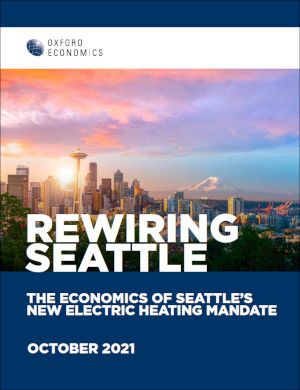Recent Release | 16 Dec 2021
Rewiring Seattle: The economics of Seattle’s new electric heating mandate

Economic Consulting Team
Oxford Economics

Effective June 1, 2021, the city of Seattle prohibits all natural gas and most electric resistance heating in new commercial construction and new residential construction over three stories.
The three types of heating
To understand the economic implications of these new rules, it is important to understand the three ways in which buildings are heated:
- By burning natural gas (or another fuel like propane or fuel oil)
- By converting electrical energy into heat through electric resistance
- By moving heat energy from the outside using a heat pump
The economics of these three heating methods are quite different. Electric resistance has low equipment costs, but high costs of use. Electric heat pumps have high equipment costs but only one third to one half the variable heating costs of electric resistance. Natural gas has operational costs similar to that of heat pumps, but lower equipment costs (though still higher than electric resistance).
Heat pumps also loose effectiveness as the temperature drops, requiring supplemental heat below about 30°F. This supplemental heat can be either electric resistance or natural gas, but the new Seattle rules only allow electric resistance. This results in a concerning vulnerability in the power grid, as demand for inefficient electric resistance heating will spike on the coldest nights of the year.
Cost implications
Because heat pumps have significantly higher upfront costs than either natural gas or electric resistance, the new rules impose significant costs on heating users. We estimate the cost of the new rules’ space heating requirements on Seattleites to reach approximately $49 million annually after 15 years. If the mandate were extended to all new construction, we estimate the costs would be approximately $61 million annually after 15 years. If all existing residential and commercial buildings were required to be retrofitted to meet the new rules, we estimate the annualized cost would be approximately $356 million.
These costs will have a greater burden on low-income households both because they have less resources with which to bear these costs, and also because they are more likely to economize by using less heat, and so the high fixed cost of heat pumps will affect them more. They are also likely to derive less value from the space cooling (air conditioning) that heat pumps also provide.
Carbon implications
The stated purpose of the electrification rules is to reduce carbon emissions. However, when benchmarked against the US electric grid as a whole, a shift from natural gas heating to electric heat pumps would result in only a 2% reduction in carbon emissions. When benchmarked against a modern combined cycle natural gas power plant—the marginal source of additional generating capacity in most parts of the US—this shift would result in a 31% emissions decline.
However, if natural gas heat were replaced by electric resistance heat—for example, when electric resistance is used as a backup for heat pumps at low temperatures—overall carbon emissions would rise by 72% if the electricity came from a combined cycle natural gas plant, and by 145% if it were sourced from the US power grid as a whole.
About the team
Our Economic Consulting team are world leaders in quantitative economic analysis, working with clients around the globe and across sectors to build models, forecast markets and evaluate interventions using state-of-the art techniques. Lead consultants on this project included:

Dan Martin
Senior Economist
+1 646 503 3056

Private: Dan Martin
Senior Economist
New York, United States

Hamilton Galloway
Head of Consultancy, Americas
+1 (646) 503 3068

Hamilton Galloway
Head of Consultancy, Americas
New York, United States
Hamilton Galloway joined Oxford Economics in 2014 as Head of US Consultancy – a team focused heavily on developing quality, customized research, analysis and impact modeling services for a range of private and public organizations. Prior to joining Oxford Economics, Mr. Galloway worked nearly seven years as an economist, senior consultant and manager at Economic Modeling Specialists Int (EMSI), a data and analytic company based in the US.
Mr. Galloway’s work included building a consultancy presence in the US, conducting bespoke economic and labour market research and engaging public and private sector clients. In 2013/14 he lived and worked in the UK as a senior consultant, focusing on developing data-driven, decision-making analytics and reports for use across public entities and education. He has authored numerous reports, publications, as well as economic development user guides and even a textbook chapter.
Related Services

Post
The economic impact of abandoning the WTO
Oxford Economics have been commissioned by the International Chamber of Commerce (ICC) to provide an independent assessment of the economic impact of WTO dissolution. This report details our findings and the assumptions underpinning our analysis.
Find Out More
Post
The economic impact of the sports activities of public service media
This study shows how the sports activities of public service media supported €4.5 billion of GDP and 57,000 jobs across 31 European countries in 2022. The report also highlights wider economic benefits of public service media sports coverage, such as the way in which it leverages sponsorship income for sports bodies.
Find Out More
Post
Global Trade Education: The role of private philanthropy
Global trade can amplify economic development and poverty alleviation. Capable leaders are required to put in place enabling conditions for trade, but currently these skills are underprovided in developing countries. For philanthropists, investing in trade leadership talent through graduate-level scholarships is an opportunity to make meaningful contributions that can multiply and sustain global economic development.
Find Out More
